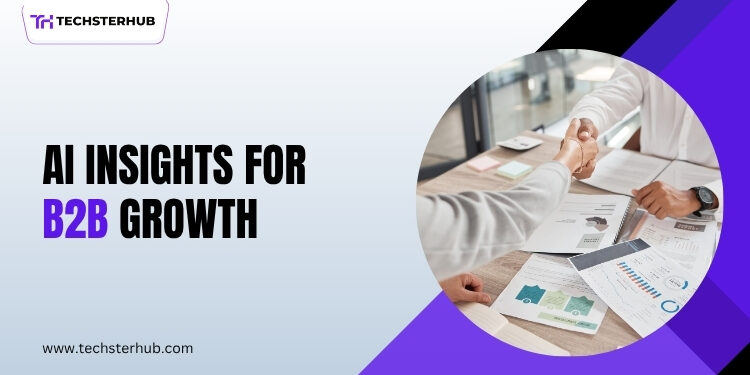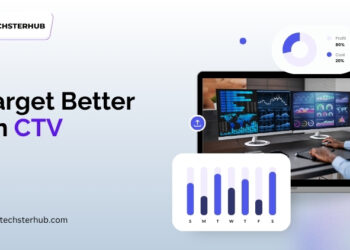B2B marketing has experienced a significant change in the last decade, moving away from monolithic, outbound marketing methods towards highly targeted, data-driven, and digitally enabled marketing. The next development in that journey and the one which is most exciting right now, is the explosion in artificial intelligence (AI). What was thought of as a way forward experiment, is now a mission-critical element of modern B2B marketing strategy.
AI adoption in B2B marketing is accelerating because businesses face more complexity than ever. Buying cycles are longer. Decision making involves more stakeholders. Digital interactions produce an endless amount of data but meaningful insights are still more difficult to find. Teams are being asked to do more – achieve deeper personalization, yield measurable revenue impact and be faster across channels – while working on compressed budgets.
AI helps to solve many of these challenges It brings in speed, intelligence and automation that gives marketers less time to worry about manual execution and more time to consider strategic direction. This article discusses the leading forces driving B2B organizations to adopt artificial intelligence and how those factors are changing the role of marketing in revenue generation.
The Trend Towards Revenue-Based Marketing
Historically, B2B marketing was looked upon as a brand building and lead-driving function. Today, marketing leaders are held accountable to provide measurable results for businesses, and they do this by gaining access to pipelines and revenue. This shift is a major factor in AI adoption.
AI helps to drive revenue-oriented marketing by:
- Identifying high value audiences faster
• Predicting the buying behavior and conversion probability
• Improving the qualifications of leads and precision of scoring
• Optimizing Spends on Impact of Performance
• Reducing Time from Awareness to Closed Business
Revenue accountability not only needs real-time insights for decision-making, but automated decisions, which AI does well at scale. As B2B organizations increasingly deepen their pursuit for sales alignment and pipeline efficiency, AI has emerged as a key factor to be integrated to provide a bridge between data, action and results.
Increasing Complexity of B2B Buying Journey
The modern B2B buyer does not have a predictable funnel. Instead, the journey includes the following:
- Wide scope of extensive education via the internet
• Numerous content interaction prior to engagement
• Buying Committees 6-10+ stakeholders
• Cross-Device and Cross Channel Research & Evaluation
• High expectations of relevancy and personalisation
This complexity requires using customer intelligence that goes beyond targeting a firmographic approach. AI helps marketers:
- Map out nonlinear buying behavior
• Capturing the intent signals in the digital spaces;
• Contextual Marketing: Circulate relevant content at every single point.
• Capitalize on predictive analytics to find opportunities for deal acceleration
The ability to interpret millions of behavioral cues and convert them into actionable insight is a powerful reason B2B marketing teams are accelerating AI adoption.
The Scalability Demand for Customization
B2B buyers expect personalization on a consumer level. Generic messaging is no longer effective, particularly in high-stake purchase decisions, where relevance and credibility are important.
AI enables:
- Hybrid recency, engagement, and popularity algorithm.
• Message based on Persona using real-time signals
• Personalized account experiences (ABM At Scale)
• User engagement driven email workflow
• Creative and copy variation optimization
Marketers can go beyond segmentation to individual level of personalisation supported by data. This creates greater depths of trust, greater levels of engagement, and a greater potential for conversion at all levels of the customer buying process.
Data Growth and Intelligence Requirement
B2B organizations currently aggregate more data than is reasonable to interpret. CRM platforms, marketing automation systems, information and account-based marketing (ABM) tools, website analytics, intent data providers, customer service ecosystems all are rich sources of information that create a patchwork of information.
Without AI (Artificial Intelligence) much of that data languishes unused.
AI has the ability to help marketing teams by:
- Synthesize, Unify Cross System Data
• Cover up patterns that are hidden to human analysis
• Be able to predict behaviour statistically
• Maximizing value involves removing the guess-work from decision making:
• Automate reporting, and optimization and forecasting
AI makes manageable volumes of raw data informative and appealing into structured and explicit insights used for direct support of smarter strategy and spend decisions. This raises the maturity of data throughout the organization and the marketing’s strategic leadership role.
Automation Pressure and Efficiency of Resources
Many B2B marketing teams are working on lower budgets with sky-high programs to implement on more channels. Workflows driven by manual processes cannot be grown to meet soaring expectations.
AI generate automation that assists teams:
- Reduce repetitive production work
• Accelerate the timelines of the campaign execution
• Increase the consistency of operations
• Increase output without adding headcount
• Enhance collaboration between marketing, sales, and customer success
Efficiency is a major driver of AI adoption because it enables growth without proportional budget increases. Teams become far more agile, more productive, and able to serve complicated, world-wide campaigns.
Greater Accountability and Performance Transparency
B2B organizations need to see the proof of marketing’s effects. AI gives precision of analytics that confirms investment decisions and performance results.
With AI-powered measurement and attribution, marketers can:
- Track influence on multi-touch buyer journeys
• Assign value to certain channels and assets
• Account level attribute revenue contribution
• Understand which strategies produce the greatest ROI
• Refine budgets in real time to reduce waste
CFOs and CEOs now have an expectation of this kind of financial clarity. AI gets marketing leaders the intelligence to be confident to defend and grow their programs.
The Emergence of Account Based Marketing (ABM)
ABM has transformed B2B marketing in a major way in the last decade. It focuses on strategic accounts, personalized experiences and great sales alignment AIs accelerate the maturity of ABM by:
- Aggressively prioritizing accounts with a higher likelihood to buy
• Identifying the appropriate contacts within each opportunity
• Segment referencing messaging and content to known personas
• Monitoring account utilization and progression signals
• Optimizing touch sequences in an automatic way
AI gets around the operation gaps that usually hold ABM programs back from effective scalability; therefore, it is a core technology within high-performing revenue teams.
Competitive Pressure along with Industry Evolution
As more B2B companies get on board with AI, those who don’t run the risk of lagging behind. AI delivers execution faster and smarter targeting and messaging more to ensure resonance on messaging. Now competitive advantage is dependent on:
- The speed of the insight gathering
• Risk-Brainiac Ability to Provide Intelligence of Content Delivery
• The ability of continuous campaign refinement
• The strength of pipeline growth and deal acceleration
The market rewards those who are using AI to make better decisions earlier. Competitors who are not yet willing to take on the AI will be faced with widening performance gaps.
AI Augments, Not Substitutes, Human Creativity
A key factor accelerating AI adoption is growing confidence that AI is not replacing strategic and creative roles. Instead, AI eliminates operational friction so that talent can spend its time doing the work that provides real marketing value.
The real driver is human innovation and it leads in the following areas:
- Brand storytelling
• Creative ideation
• Strategic positioning
• Emotional intelligence and empathy
• Relationship building with stakeholders
AI enhances the smart implementation of those ideas. B2B leaders know success is a blended approach: human creativity delivered with the help of an AI-powered Decision intelligence.
How leadership influences and how organizations are ready
Understanding by executives that digitization transformation is dependent on marketing evolution is increasingly becoming a fact. Modern B2B leaders focus on investment in:
- AI technology
• Team upskilling
• Integrated martech ecosystems
• Revenue-driven performance frameworks
Leadership support creates the culture in which experimentation and innovation are encouraged. As the adoption gains momentum, AI adoption becomes part of the organization operating identity, versus an isolated toolset.
Ethical, Governance, and Security Issues
As AI adoption grows, so has the focus on governance, compliance, and ethical standards. B2B organizations need to safeguard customer data and ensure this entity does use models transparently and maintains responsible decision-making practices.
Marketers that have took strong data stewardship and have a clear list of guardrails can confidently use the power of AI to retain trust on their brand. This well-arranged approach encourages the AI adoption as it assures that the risks are managed responsibly.
Conclusion
How artificial intelligence is making its way into B2B marketing is a result of urgent and transformative business requirements. Marketers are faced with having to navigate increasing complexity, deliver credible revenue results, offer scalable personalization, and be efficient and accountable. AI will help the teams fulfil these requirements quickly, accurately, and flexibly in long-term context.
AI adoption is not a technology trend; it is a strategic necessity. B2B businesses that embrace AI in a thoughtful and proactive manner will not only be able to perform more efficiently today, but do so in a way that will provide a competitive advantage that compounds over time.
The future of B2B marketing is with the teams who know how to combine human stratification and creative intelligence, with AI-powered data. Together, they provide a far more intelligent, robust, and revenue-oriented model for growth.











